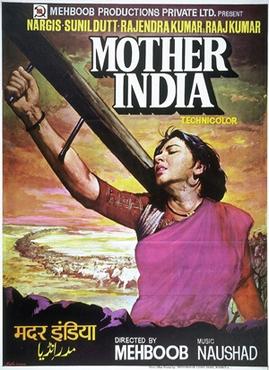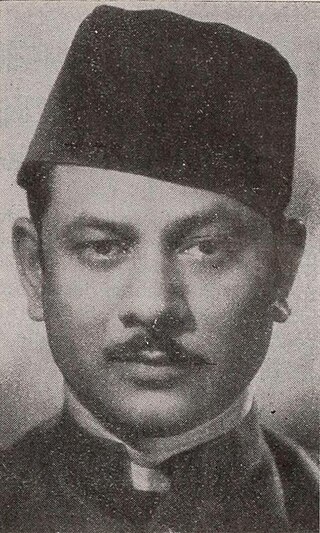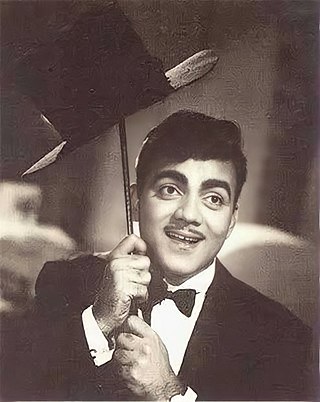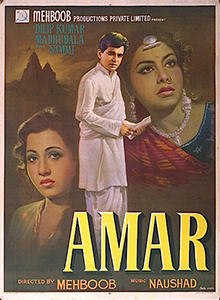Related Research Articles

Mother India is a 1957 Indian epic drama film, directed by Mehboob Khan and starring Nargis, Sunil Dutt, Rajendra Kumar and Raaj Kumar. A remake of Khan's earlier film Aurat (1940), it is the story of a poverty-stricken village woman named Radha (Nargis), who in the absence of her husband, struggles to raise her sons and survive against a cunning money-lender amidst many troubles.

Mehboob Khan was a pioneer producer-director of Indian cinema, best known for directing the social epic Mother India (1957), which won the Filmfare Awards for Best Film and Best Director, two National Film Awards, and was a nominee for the Academy Award for Best Foreign Language Film. He set up his production company – Mehboob Productions, and later a film studio – Mehboob Studios in Bandra, Mumbai in 1954. He also created the dacoit film genre with Aurat (1940) and Mother India, and is also known for other blockbusters including the romantic drama Andaz (1949), the swashbuckling musical Aan (1951), and the melodrama Amar (1954).

Andaz Apna Apna is a 1994 Indian Hindi-language comedy film directed by Rajkumar Santoshi and produced by Vinay Kumar Sinha. It stars Aamir Khan, Salman Khan, Raveena Tandon, Karishma Kapoor, Paresh Rawal and Shakti Kapoor in lead roles. The film was released on 4 November 1994 and the plot elements of the film were later used in other language films such as Ullathai Allitha (1996), Veedevadandi Babu (1997) and Galate Aliyandru (2000), though none being a frame-to-frame remake. Although the film was a semi-hit at the box office, the film has emerged as a cult film over the years. The lexicon of the film has become part of everyday and ordinary language. The climax of this film is a rehashed version of the climax of a 1972 film Victoria No. 203.

Mehmood Ali, popularly known simply as Mehmood, was an Indian actor, singer, director and producer best known for playing comic roles in Hindi films.

Nimmi, was an Indian screen actress who achieved stardom in the 1950s and early 1960s in Hindi films. She was one of the leading actresses of the "golden era" of Hindi cinema.

Amar (transl. "Immortal") is a 1954 Indian Hindi-language romantic drama film produced and directed by Mehboob Khan. Dealing with the controversial subject matter of rape, the film revolves around the titular upper-class lawyer, his feminist fiancé, the social worker Anju Roy (Madhubala), and Sonia (Nimmi), a poor milkmaid.
Hamid Ali Murad known simply as Murad was an Indian character actor who appeared in more than 200 Hindi language films from the early 1940s through to the end of the 1980s, playing character roles of a father, police officer, judge and an emperor.

Nalini Jaywant was an Indian actress who appeared in Hindi films in the 1940s and 1950s. Filmfare in their poll in the 1950s declared her the most beautiful woman in the movies. Actor Dilip Kumar described her "the greatest actress he ever worked with".
S. Ali Raza was an Indian film screenwriter and director associated with writing the script for hit films such as Aan, Andaz, Mother India, Reshma Aur Shera, Raja Jani and Dus Numbri.

Anmol Ghadi is a 1946 Indian drama film directed by Mehboob Khan, starring Surendra, Suraiya, Noor Jehan and Zahur Raja.

Mehboob Studio is an Indian film studio and recording studio in Bandra (W), Mumbai, founded in 1954 by director and producer Mehboob Khan, who previously owned Mehboob Productions, and is most known for films such as Mother India (1957), which won the Filmfare Awards for Best Film and Best Director and was a nominee for the Academy Award for Best Foreign Language Film. It is spread over 20,000 square yards and includes five shooting stages. It soon become popular with directors such as Guru Dutt, Chetan Anand and Dev Anand. In the following decades it was used by Manmohan Desai extensively. A recording studio was added in the 1970s and both remain in use.

Duniya is a 1968 Indian Hindi-language romantic thriller film written by K. A. Narayan and directed by T. Prakash Rao. The film starred Dev Anand, Vyjayanthimala in the lead with Balraj Sahni, Johnny Walker, Lalita Pawar, Prem Chopra, Sulochana Latkar, Madan Puri, Nana Palsikar, Achala Sachdev, Laxmi Chhaya, Jagdish Raj, Tun Tun, Brahm Bhardwaj and Pakistani actor Suresh as the ensemble cast. The film was produced by Amarjeet. The film's score was composed by Shankar Jaikishan duo with lyrics provided by Hasrat Jaipuri, S. H. Bihari and Gopaldas Neeraj, edited by Shivaji Awdhut and was filmed by Faredoon A. Irani. The story revolves around three friends, how they face their problems in life, and how they recover from the problems in the rest of the story.

Kanhaiyalal was an Indian actor who acted in 122 films in his career, primarily in Hindi films produced in Bollywood, the Mumbai-based film industry.
Al Hilal is a 1935 Urdu/Hindi costume drama film. It was the debut directorial venture of Mehboob Khan. He went on to become "one of the pioneer directors of Indian Cinema". The film is thought to be inspired by Cecil B. DeMille's The Sign of the Cross. The film was produced by Sagar Movietone. The director of photography was Faredoon Irani. The music composer was Pransukh Nayak with lyrics by Munshi Ehsan Lucknavi. It starred Kumar, Indira, Yakub, Sitara Devi, Kayam Ali and Mehboob Khan. The film depicted fictionalised history in the form of a Roman-Arab conflict, with the son of the Ottoman Empire being captured by the Roman army and his escape from them.

Watan (transl. Country) is a 1938 Hindustani costume drama film directed by Mehboob Khan. Produced by Sagar Films, the film had story by Mehboob Khan and Wajahat Mirza. The cinematographer, as for most Sagar films was Faredoon Irani. Following the successful music of Manmohan (1936), Sagar Movietone retained Anil Biswas as the in-house music director, scoring music for Watan along with other releases of the time from the studio. The cast of the film included Kumar, Bibbo, Maya Banerjee, Yakub Lala, Sitara Devi and Kayam Ali.
Manmohan is a 1936 Indian Urdu/Hindi-language romantic tragedy film directed by Mehboob Khan. This was Khan's third film for Sagar Movietone after Al Hilal (1935) and Deccan Queen (1936). The cinematographer was Faredoon Irani who, starting from Mehboob Khan's Al Hilal (1935) went on to establish a long working relationship with him lasting till Khan's last film Son of India (1962). The music was composed by Ashok Ghosh assisted by Anil Biswas. The story writer was Zia Sarhadi who also wrote the lyrics, screenplay and dialogue in addition to acting in the film. Though he had started his writing career on Khan's backing for Deccan Queen (1936), it was with Manmohan that he achieved success. The film was inspired by Devdas, (1935), which was a big hit at the box office. Surendra was chosen as the singing star to rival K. L. Saigal from New Theatres Calcutta, whose songs from Devdas had mesmerised the nation. Though Manmohan was referred to as the "poor man's Devdas" it went on to do well and the songs became very popular. The film starred Bibbo, Surendra, Yakub, Kayam Ali, Bhudo Advani and Mehdi Raza.
Deccan Queen is a 1936 Hindustani action-adventure film directed by Mehboob Khan. It was the first "stunt" film from Sagar Movietone and the first film for actor Surendra, who was credited as "Surendra Nath B.A., L.L.B.". The film helped launch him as a singing star. This was the only action film directed by Mehboob Khan as he later shifted to films with social and political slant. This was Mehboob Khan's second directorial venture after Al Hilal (1935). He asked Zia Sarhadi then an unknown small-time actor, to write the screenplay, dialogue and songs for Deccan Queen. The music direction was by Pransukh Nayak along with Ashok Ghosh. The cinematographer was Faredoon Irani. The film starred Surendra, Aruna Devi, Ramchandra Pal and Kayam Ali.

Anokhi Ada is a 1948 romantic Hindi film directed by Mehboob Khan. The story was by Zia Sarhadi, with screenplay and dialogue by Agha Jani Kashmiri. The music composer was Naushad, assisted by Ghulam Mohammed and the lyricists were Shakeel Badayuni and Anjum Pilibhiti. The director of photography was Faredoon Irani. It was produced under the Mehboob Productions banner and starred Naseem Banu, Surendra, Prem Adib, Zeb Qureshi, Reehan, Pratima Devi and Cuckoo.

Surendra was an Indian singer-actor of Hindi films. Known by his mononym, Surendra was born and educated in Punjab to be a lawyer by profession. He came to Bombay to become a singer on the recommendation of a Delhi distributor and his friends. He was "picked" by Mehboob Khan whom he met at Sagar Movietone, to sing and act in films as an alternative to the then Calcutta-based singer-actor, K. L. Saigal. Surendra started his career with his debut starring role in Deccan Queen (1936), directed by Mehboob Khan. He soon became a part of Sagar Movietone when his song "Birha Ki Aag Lagi More Man Mein" from the film became an "instant hit".

Sagar Movietone also Sagar Films, Sagar Film Company and Sagar Productions was an Indian film production company involved in the making of films for Indian cinema. It was launched by Ardeshir Irani with Chimanlal Desai and Dr. Ambalal Patel in 1929 in Bombay, Maharashtra, India. Sagar was initially started as a branch company of Ardeshir's Imperial Film Company. Several key figures from Imperial, such as Mehboob Khan were shifted to Sagar. The studio was in operation from 1930 to 1939. In 1940, it combined with General Pictures to form National Studios. It made "Parsi theatre based films, mythologicals and stunt movies". Sagar fostered the career of many artists who rose to prominence. Early directors such as Prafulla Ghosh, Sarvottam Badami, Ezra Mir and Nanubhai Vakil were promoted by the company. Mehboob Khan got his first break as a director in Al Hilal in 1935. He was referred to as "the most important alumnus" from Sagar, who went on to become one of Indian cinema's "most influential film-makers".
References
- ↑ "Aan". Upperstall. 14 April 2005. Retrieved 4 May 2013.
- ↑ Aan Archived 6 January 2007 at the Wayback Machine University of Iowa.
- ↑ "Mehboob Khan Profile". Upperstall. 28 May 2004. Retrieved 4 May 2013.
- ↑ Us Salam, Ziya (7 January 2010). "Mother India (1957)". The Hindu. Retrieved 27 October 2018.
- ↑ Film World, Vol. 1.T.M. Ramachandran, 1964. p. 97.
- ↑ "History". Western India Cinematographers' Association. Archived from the original on 24 December 2013. Retrieved 4 May 2013.
- ↑ "Best Cinematographer Award (B&W), Colour". Official Listing, Indiatimes. Archived from the original on 4 March 2016. Retrieved 28 April 2013.
- Gulzar; Govind Nihalani; Saibal Chatterjee (2003). "Major Cinematographers..". Encyclopaedia of Hindi Cinema. Popular Prakashan. p. 252. ISBN 8179910660.